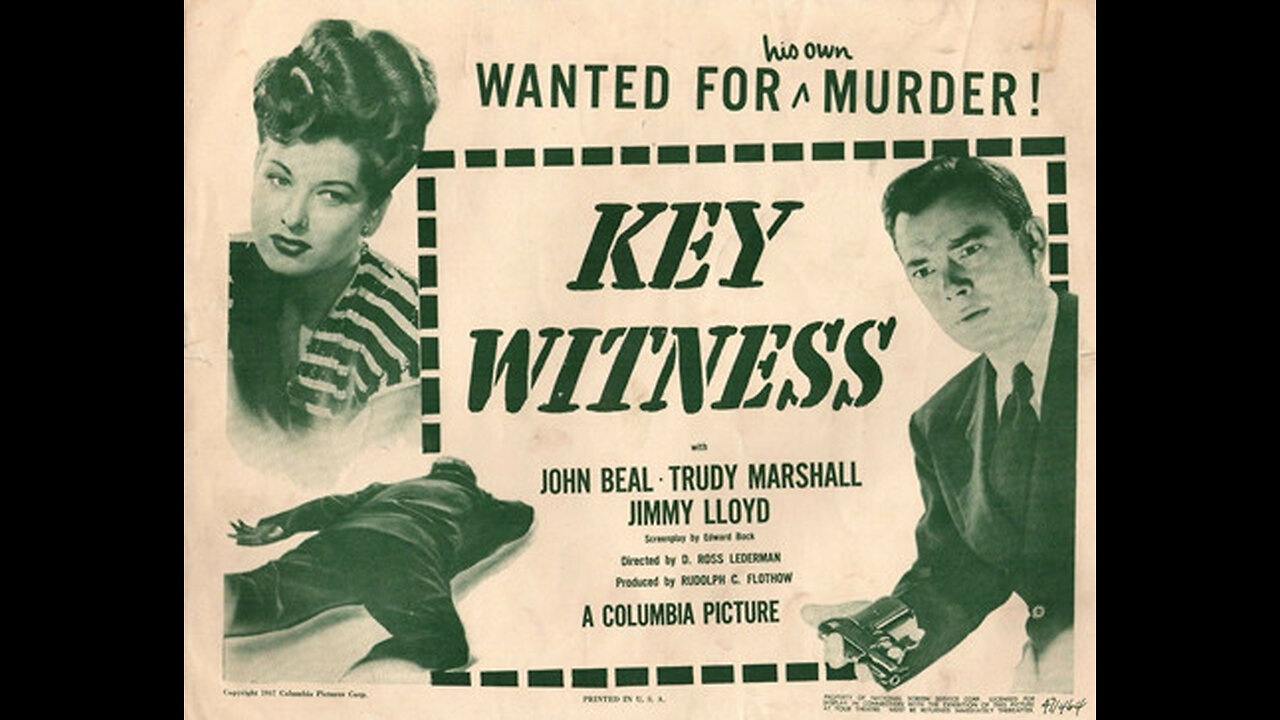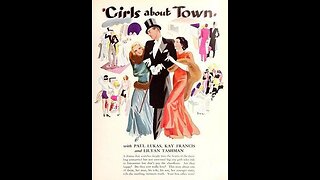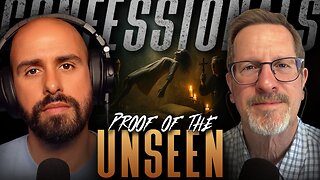Premium Only Content

Key Witness (1947) | A film noir directed by D. Ross Lederman
"Key Witness" is a film noir released in 1947, directed by D. Ross Lederman. Starring John Beal, Trudy Marshall, and Jimmy Lloyd, the movie is a classic example of the crime drama genre prevalent in the post-war era. The story revolves around a man wrongfully accused of murder and the efforts to clear his name.
The plot centers on Johnny March (John Beal), a mild-mannered accountant who becomes entangled in a murder investigation when he stumbles upon the body of a nightclub singer, Jenny Wren (Trudy Marshall). Johnny is mistakenly identified as the prime suspect, and the police, led by Detective Lieutenant Louie Ferrari (Jimmy Lloyd), believe they have an open-and-shut case.
Determined to prove his innocence, Johnny goes on the run, trying to uncover the truth behind the murder. Along the way, he encounters a variety of characters, including a sympathetic journalist named Terry Connors (Helen Chambers), who decides to help him. Together, they navigate the criminal underworld and face numerous obstacles in their quest for justice.
As the investigation unfolds, secrets are revealed, and Johnny's journey takes unexpected turns. The film delves into themes of mistaken identity, corruption, and the search for truth in a noir-infused atmosphere of suspense and intrigue.
John Beal delivers a convincing performance as the beleaguered Johnny March, and Trudy Marshall adds depth to the narrative as the ill-fated nightclub singer. Jimmy Lloyd's portrayal of Detective Ferrari adds a layer of tension to the film, reflecting the classic noir motif of a dogged law enforcement officer.
The cinematography, likely influenced by the noir aesthetic, uses shadows and low-key lighting to create a moody atmosphere fitting for a crime drama. The musical score, composed by Paul Sawtell, complements the film's tension and suspense, accentuating key moments in the narrative.
"Key Witness" is an example of the B-movie crime dramas that were prevalent in the 1940s and 1950s, featuring a relatively short runtime and a straightforward narrative. While it may not be as well-known as some other films from the era, it captures the essence of the crime genre with its themes of innocence, pursuit, and the quest for truth, making it a notable addition to the classic noir tradition.
-
 1:19:21
1:19:21
Classic Films & Movies Archive
8 days agoGirls About Town (1931) | Directed by George Cukor
3003 -
 LIVE
LIVE
LFA TV
3 hours agoLFA TV ALL DAY STREAM - WEDNESDAY 8/27/25
6,638 watching -
 1:22:55
1:22:55
Game On!
18 hours ago $2.62 earnedBREAKING NFL NEWS: Taylor Swift and Travis Kelce Are Engaged!
29.9K11 -
 41:04
41:04
Coin Stories with Natalie Brunell
1 day agoCooking, Culture & Crypto: Norma Chu’s Food Empire Turns Bitcoin Treasury
24.8K -
 LIVE
LIVE
JuicyJohns
1 hour ago $0.15 earned🟢#1 REBIRTH PLAYER 10.2+ KD🟢
48 watching -
 1:21:19
1:21:19
JULIE GREEN MINISTRIES
3 hours agoDIRTY POLITICIANS WILL BE ARRESTED AND REMOVED FROM POWER
63.3K162 -
 LIVE
LIVE
GritsGG
1 hour agoWin Streaking! Most Wins 3485+ 🧠
21 watching -
 1:02:09
1:02:09
The Confessionals
21 hours agoThe Supernatural Proof You Can’t Ignore (When Angels and Demons Showed Up) | Lee Strobel
41.3K24 -
 15:24
15:24
Degenerate Jay
22 hours ago $1.10 earned5 Best Moments In Batman: Arkham Asylum
23.4K1 -
 12:24
12:24
The Shannon Joy Show
15 hours ago🔥From Flock Cameras to Palantir: America’s Expanding Digital Cage🔥
23.4K2